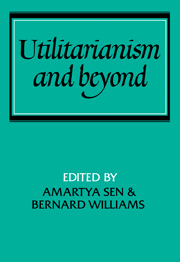Book contents
- Frontmatter
- Contents
- Preface
- Introduction: Utilitarianism and beyond
- 1 Ethical theory and utilitarianism
- 2 Morality and the theory of rational behaviour
- 3 The economic uses of utilitarianism
- 4 Utilitarianism, uncertainty and information
- 5 Contractualism and utilitarianism
- 6 The diversity of goods
- 7 Morality and convention
- 8 Social unity and primary goods
- 9 On some difficulties of the utilitarian economist
- 10 Utilitarianism, information and rights
- 11 Sour grapes – utilitarianism and the genesis of wants
- 12 Liberty and welfare
- 13 Under which descriptions?
- 14 What's the use of going to school?
- Bibliography
Introduction: Utilitarianism and beyond
Published online by Cambridge University Press: 30 January 2010
- Frontmatter
- Contents
- Preface
- Introduction: Utilitarianism and beyond
- 1 Ethical theory and utilitarianism
- 2 Morality and the theory of rational behaviour
- 3 The economic uses of utilitarianism
- 4 Utilitarianism, uncertainty and information
- 5 Contractualism and utilitarianism
- 6 The diversity of goods
- 7 Morality and convention
- 8 Social unity and primary goods
- 9 On some difficulties of the utilitarian economist
- 10 Utilitarianism, information and rights
- 11 Sour grapes – utilitarianism and the genesis of wants
- 12 Liberty and welfare
- 13 Under which descriptions?
- 14 What's the use of going to school?
- Bibliography
Summary
Arguments for and against utilitarianism are both forcefully presented in the papers in this volume. Not all the authors represented here would want to go ‘beyond’ utilitarianism at all, while those (the majority) who are critical of utilitarianism differ about the direction in which they would like to proceed. Some – such as Hahn and Dasgupta – have pointed to specific difficulties with utilitarianism and these would require relaxing the uncompromising narrowness of the utilitarian vision, but possibly not a rejection of the entire approach. Others – such as Hampshire and Taylor – have argued for a totally different route – less ambitious in scope, not tied to consequential analysis, nor to utility itself, and without the insistence on impersonality which characterises utilitarianism (along with some other outlooks).
The title of this collection, Utilitarianism and beyond, perhaps most naturally implies an attempt to solve in some more refined, comprehensive or otherwise satisfactory way problems to which utilitarianism has offered only partial or unsatisfactory solutions. But this implication is to some extent misleading, since critics such as Hampshire and Taylor would insist that the questions which utilitarianism tries to answer are not proper questions, or not questions which require that kind of answer. For such critics, the appropriate slogan might rather be ‘Utilitarianism and not so far’. They will feel that utilitarianism represents an attempt to do too much, to give too comprehensive and extensive an answer to problems of personal or public choice, and that it is not simply utilitarianism that is at fault, but any theory which displays that degree of ambition.
- Type
- Chapter
- Information
- Utilitarianism and Beyond , pp. 1 - 22Publisher: Cambridge University PressPrint publication year: 1982
- 23
- Cited by



